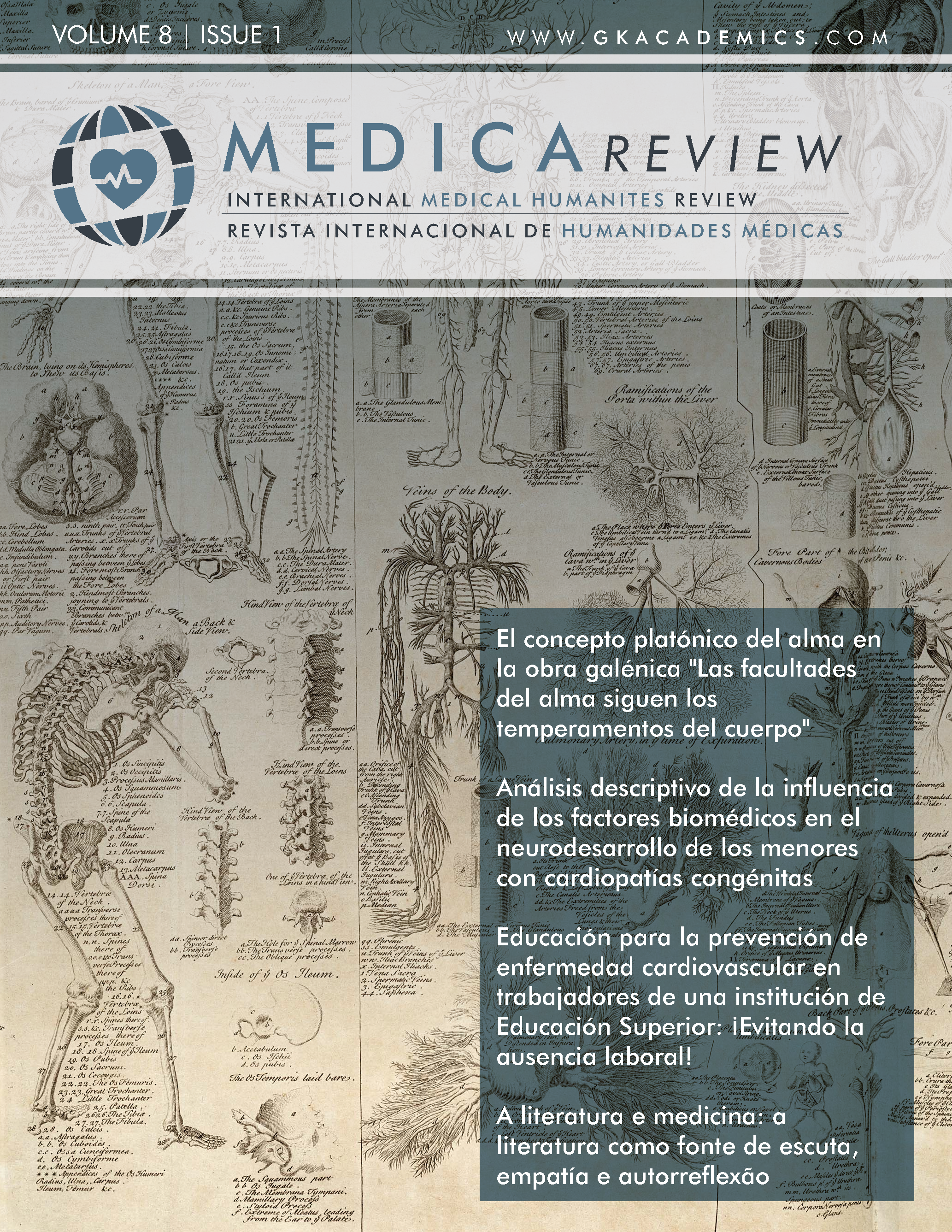Literature and Medicine: Literature as a Source of Listening, Empathy and Self-Reflection
DOI:
https://doi.org/10.37467/gka-revmedica.v8.2234Keywords:
Medical Humanities, Narrative Medicine, Medical listening, Empathy, Self-reflection, Self-careAbstract
Modern times have brought advances in the understanding of diseases, new diagnostic and therapeutic resources and the revolutionary use of technology, allowing the progress of medicine. To cover the complexity of the progress of scientific evidence, medical training has reinforced and privileged scientific knowledge. The investment in the formation of humanistic, language, communication, listening and empathy skills was not equivalent to technical training. Such imbalance has shown losses in the ability of the modern physician to listen carefully, to understand globally and to relate appropriately to his patients. Despite this, initiatives to promote human and integral medicine have emerged and have been maintained in medical schools.
Global Statistics ℹ️
|
111
Views
|
33
Downloads
|
|
144
Total
|
|
References
Adler, J. M. (2013). Como falar, como ouvir. São Paulo: É Realizações.
Appel, M. & Malečkar, B. (2012). The Influence of Paratext on Narrative Persuasion: Fact, Fiction, or Fake? Human Communication Research, 38(4), 459–484. https://doi.org/10.1111/j.1468-2958.2012.01432.x
Batt-Rawden, S. A., Chisolm, M. S., Anton, B., & Flickinger, T. E. (2013). Teaching empathy to medical students: An updated, systematic review. Academic Medicine, 88(8), pp. 1171–1177. https://doi.org/10.1097/ACM.0b013e318299f3e3
Beckman, H. B. & Frankel, R. M. (1984). The effect of physician behavior on the collection of data. Annals of Internal Medicine, 101(5), 692–696. https://doi.org/10.7326/0003-4819-101-5-692
Broyard, A. (1993). Intoxicated by my illness and others writings on life and death. New York: Fawcett Columbine.
Candido, A. (2011). Vários escritos. Rio de Janeiro: Ouro sobre Azul.
Charon, R. (2001). Narrative medicine: A model for empathy, reflection, profession, and trust. Journal of the American Medical Association, 286(15), pp. 1897–1902. https://doi.org/10.1001/jama.286.15.1897
Charon, R. (2007). What to do with stories: The sciences of narrative medicine. Canadian Family Physician, 53(8), pp. 1265–1267.
Charon, R. (2013). Narrative medicine in the international education of physicians. Presse Medicale, 42(1), pp. 3–5. https://doi.org/10.1016/j.lpm.2012.10.015
Charon, R. (2015). O corpo que se conta - porque a medicina e as histórias precisam uma da outra. São Paulo: Letra e Voz.
Djikic, M., Oatley, K. & Moldoveanu, M. C. (2013). Reading other minds: Effects of literature on empathy. Scientific Study of Literature, 3(1), 28–47. https://doi.org/10.1075/ssol.3.1.06dji
Ferreira, E. M. A. (2014). A escuta sensível das narrativas médicas. Intersemiose, 5, 78–98.
Frich, J. C. & Jørgensen, J. (2000). Medicine and literature-interpretation and discussion of literary texts in medical education. Tidsskrift for Den Norske Laegeforening : Tidsskrift for Praktisk Medicin, Ny Raekke, 120(10), pp. 1160–1164. http://www.ncbi.nlm.nih.gov/pubmed/10863345
Gallian, D. (2017). A literatura como remédio: os clássicos e a saúde da alma. São Paulo: Martins Claret.
Gleichgerrcht, E., & Decety, J. (2014). The relationship between different facets of empathy, pain perception and compassion fatigue among physicians. Frontiers in Behavioral Neuroscience, 8(july). https://doi.org/10.3389/fnbeh.2014.00243
Hampshire, A. J. & Avery, A. J. (2001). What can students learn from studying medicine in literature? Medical Education, 35(7), 687–690. https://doi.org/10.1046/j.1365-2923.2001.00969.x
Hunter, K. M., Charon, R. & Coulehan, J. L. (1995). The Study of Literature in Medical Education. Acad Med, 70(9), 787–794.
Keen, S. (2006). A theory of narrative empathy. Narrative, 14(3), 207–236. https://doi.org/10.1353/nar.2006.0015
Kidd, D. C. & Castano, E. (2013). Reading literary fiction improves theory of mind. Science, 342(6156), 377–380. https://doi.org/10.1126/science.1239918
Koopman, E. M. (E.). (2016). Effects of “literariness” on emotions and on empathy and reflection after reading. Psychology of Aesthetics, Creativity, and the Arts, 10(1), 82–98. https://doi.org/10.1037/aca0000041
Koopman, E. (2015). How texts about suffering trigger reflection: Genre, personal factors, and affective responses. Psychology of Aesthetics, Creativity, and the Arts, 9(4), 430–441. https://doi.org/10.1037/aca0000006
Koopman, E. & Hakemulder, F. (2015). Effects of Literature on Empathy and Self-Reflection: A Theoretical-Empirical Framework. Journal of Literary Theory, 9(1). https://doi.org/10.1515/jlt-2015-0005
Lancaster, T., Hart, R. & Gardner, S. (2002). Literature and medicine: Evaluating a special study module using the nominal group technique. Medical Education, 36(11), 1071–1076. https://doi.org/10.1046/j.1365-2923.2002.01325.x
Mar, R. A., Oatley, K., Djikic, M., & Mullin, J. (2011). Emotion and narrative fiction: Interactive influences before, during, and after reading. Cognition and Emotion, 25(5), pp. 818–833. https://doi.org/10.1080/02699931.2010.515151
Mar, R. A., Oatley, K., & Peterson, J. B. (2009). Exploring the link between reading fiction and empathy: Ruling out individual differences and examining outcomes. Communications, 34(4), 407–428. https://doi.org/10.1515/COMM.2009.025
Marvel, M. K., Epstein, R. M., Flowers, K., & Beckman, H. B. (1999). Soliciting the patient’s agenda: Have we improved? Journal of the American Medical Association, 281(3), 283–287. https://doi.org/10.1001/jama.281.3.283
Neumann, M., Edelhäuser, F., Tauschel, D., Fischer, M. R., Wirtz, M., Woopen, C., Haramati, A., & Scheffer, C. (2011). Empathy decline and its reasons: A systematic review of studies with medical students and residents. Academic Medicine, 86(8), pp. 996–1009. https://doi.org/10.1097/ACM.0b013e318221e615
Pino, M. C., & Mazza, M. (2016). The Use of “Literary Fiction” to Promote Mentalizing Ability. PLOS ONE, 11(8), e0160254. https://doi.org/10.1371/journal.pone.0160254
Ritivoi, A. D. (2018). Empatia, intersubjetividade e compreensão narrativa - lendo as histórias, lenda as vidas (dos outros). São Paulo: Letra e Voz.
Robinson, J. D., Tate, A., & Heritage, J. (2016). Agenda-setting revisited: When and how do primary-care physicians solicit patients’ additional concerns? Patient Education and Counseling, 99(5), 718–723. https://doi.org/10.1016/j.pec.2015.12.009
Rosa, G. (2012). Grande Sertão: Veredas. Rio de Janeiro: Nova Fronteira.
Scliar, M. (2013). Território da emoção: Crônicas de medicina e saúde. São Paulo: Companhia das Letras.
Shakir, M., Vannatta, J., & Schlefer, R. (2017). Effect of College Literature and Medicine on the Practice of Medicine. Journal of the Oklahoma State Medical Association, 110, 593–600.
Shapiro, J., Morrison, E. H., & Boker, J. R. (2004). Teaching empathy to first year medical students: Evaluation of an elective literature and medicine course. Education for Health, 17(1), 73–84. https://doi.org/10.1080/13576280310001656196
Stepien, K. A., & Baernstein, A. (2006). Educating for empathy: A review. Journal of General Internal Medicine, 21(5), pp. 524–530. https://doi.org/10.1111/j.1525-1497.2006.00443.x
Street, R. L., Gordon, H., & Haidet, P. (2007). Physicians’ communication and perceptions of patients: Is it how they look, how they talk, or is it just the doctor? Social Science and Medicine, 65(3), 586–598. https://doi.org/10.1016/j.socscimed.2007.03.036
Tchekhov, A. (2014). O beijo e outras histórias. São Paulo: Editora 34.
Downloads
Published
How to Cite
Issue
Section
License
Those authors who publish in this journal accept the following terms:
- Authors will keep the moral right of the work and they will transfer the commercial rights.
- After 1 year from publication, the work shall thereafter be open access online on our website, but will retain copyright.
- In the event that the authors wish to assign an Creative Commons (CC) license, they may request it by writing to administracion@edulab.es









